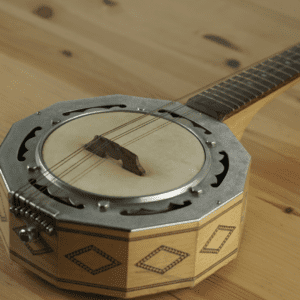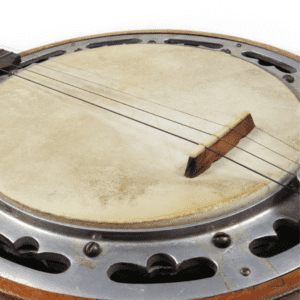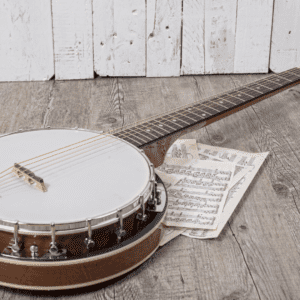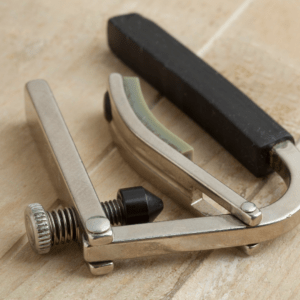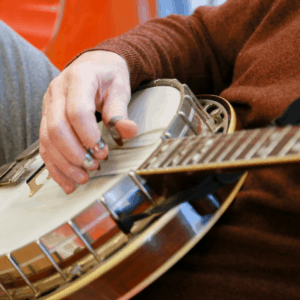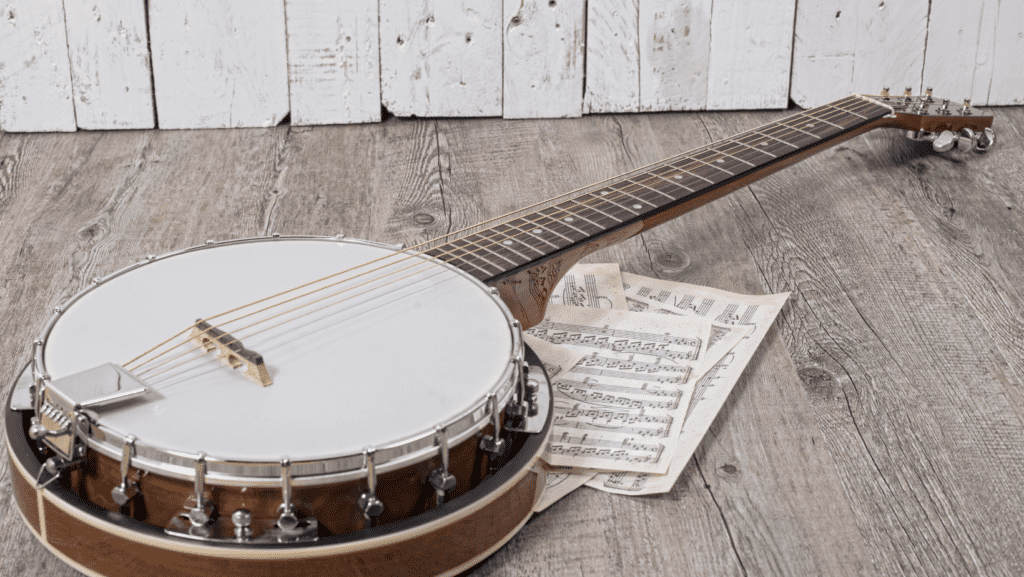
The banjo is an instrument that’s popular in folk, country, and more recently, pop and rock music. It has its origins in Western Africa and has a timeless appeal to it. Like all musical instruments, the banjo is the sum total of all its parts, and the strings are the final piece in the puzzle as to how good your instrument sounds. Good strings can elevate an average instrument and bad strings on a top-quality instrument will leave it sounding weak and uninspiring.
If you’re wondering about the best strings for your instrument, then read on.
| 1.Best Banjo Strings Editor’s Choice – D’Addario EJ69 Phosphor Bronze 5-String Banjo Strings One of the most popular strings out there made by a reputable manufacturer. Offers a great balance between strength, tone, and sound projection. | Buy on Amazon | |
| | 2.Best Banjostrings For Clawhammer – Elixir Banjo Strings w Polyweb Coating Nickel-plated, steel-wrapped strings for extra longevity. | Buy on Amazon |
| | 3. Best Banjo Strings For Bluegrass – D’Addario EJ55 5-String Banjo Strings, Phosphor Bronze, Medium, 10-23 Warm and balanced phosphor bronze wound strings with looped ends to fit most banjos. | Buy on Amazon |
| | 4.Best Banjo Strings For 6 String Banjo – GHS, Banjo Strings (PF120) Stainless steel round wound strings with a pleasing tone and extra-long, looped ends to fit most instruments. | Buy on Amazon |
| | 5. Best Tenor Banjo Strings – Ernie Ball 5-String Light Stainless Steel Banjo Strings, 9-9 Gauge (P02312) Lightweight, long-lasting strings with solid tonal production. | Buy on Amazon |
| | 6. Best Nylon Banjo Strings – Aquila New Nylgut AQ-1B Traditional sounding and feeling strings made with modern technology with a balanced and consistent tone. | Buy on Amazon |
6 best banjo strings reviewed
Best Banjo Strings Editor’s Choice: D’Addario EJ69 Phosphor Bronze 5-String Banjo Strings
The D’Addario EJ69’s are a top seller in the world of banjo strings and are favored for the easy feel and the light string tension. They are medium-sized strings that stay in tune for longer periods, whilst also offering satisfactory projection and articulation. This is their most popular string gauge that offers a great balance between durability, tone, and feel.
The loop-end design of these strings makes them suitable for almost all different types of banjo tailpieces.
Pros
- Made by one of the most popular strings manufacturers worldwide.
- Balance between tone, strength, and playability.
- Good projection and sound.
Cons
- Strings aren’t labeled which can lead to confusion and potentially putting the wrong string.
Best Banjo strings For Clawhammer: Elixir Banjo Strings w Polyweb Coating
These medium strings (.010-.023 string sizes) are made of nickel-plated steel for a rich and full tone. The Polyweb coating is supposed to help extend the life of the strings between 3 to 5 times their normal length. It does this by protecting the whole string from sweat, dirt, and humidity.
On top of this, the coating doesn’t detract from the tonal quality produced, making these strings a great choice for frailing.
Pros
- Polyweb coating extends the life of the strings.
- Nickel-plated steel wrapped.
- Protects against dirt, sweat, and humidity.
Cons
- The coating makes the strings feel alien to many players at first.
Best Banjo Strings For Bluegrass: D’Addario EJ55 5-String Banjo Strings, Phosphor Bronze, Medium, 10-23
D’Addario is one of the most popular manufacturers of strings across all instruments. The EJ 55 are Phosphor Bronze banjo strings that add a warm and balanced tone to your playing. They have been favored by many popular bluegrass players across time.
The medium gauge of the strings makes them easier for the beginner to learn with as well as fitting the discerning needs of professionals. They are very versatile strings that can also be used for fingerpicking styles of playing.
Pros
- Warm, balanced tone.
- Phosphor bronze wound 4th string for added warmth.
- Looped construction will fit most instruments.
Cons
- Some complain the winding makes the sound too ‘twangy,’ and metallic.
Best Banjo Strings For 6 String Banjo: GHS, Banjo Strings (PF120)
GHS are known for their attention to detail in all aspects of the production process of their strings; from materials to core-to-cover ratio. They are innovators and experimenters in the area and are constantly making improvements to their output.
The D, A, and E strings are pure steel, and the bottom three strings are round wound with stainless steel. The strings are extra long and are designed to fit a wide range of different tailpieces. The tone is clear, bright, and articulate on these strings, making them perfect for all kinds of players, including gigging musicians.
Pros
- Stainless steel, round wound strings.
- Extra-long, loop-ended string will fit almost every banjo.
- Lightweight with good tonal reproduction.
Cons
- Some complain of the strings not holding up to tuning.
Best Tenor Banjo Strings: Ernie Ball 5-String Light Stainless Steel Banjo Strings, 9-9 Gauge (P02312)
Ernie Ball are renowned with guitar and banjo players alike for the light and crisp tone they produce. They are durable and reliable, making them a firm favorite for players across musical boundaries and genres.
The Ernie Ball (P02312) are tin-plated with a steel loop-end and are designed for the tenor banjo to deliver quality sound and long life. They have a high carbon steel core and are long-lasting.
Pros
- Made by a renowned brand.
- Long-lasting strings.
- Light feeling and good tonal projection.
Cons
- Some complain of the loop end breaking upon installation.
Best Nylon Banjo Strings: Aquila New Nylgut AQ-1B
Aquila Nylgut strings are built to resemble the sound of traditional gut strings but with the durability of modern nylon technology. They produce the same traditional tone as genuine gut strings of old, but are more reliable and absorb less water, and are more stable.
The Aquila New Nylgut AQ-1B are perfect for anyone looking for a bright-sounding set of strings that are durable and responsive.
Pros
- Traditional sound, modern technology.
- Accurate intonation.
- Balanced and consistent sound.
Cons
- Can’t be used on banjos with metal tailpieces
Best Banjo String Buying Guide
How To Pick The Right Banjo Strings?
The right banjo strings will primarily depend on the type of banjo that you have, your playing style, and the main genres of music you want to play. The best is to try as many different ones as possible so you can hone in on the characteristics you want to get from your strings.
Luckily banjo strings are relatively inexpensive, so trying different ones won’t put you out of pocket too much. Make sure you check with the manufacturer of your banjo before changing to heavier gauge strings to ensure that your instrument can handle the extra tension and avoid any unfortunate accidents.
How Many Strings Does A Banjo Have?
The banjo that most people are familiar with has 5 strings. 4 string banjos are gaining in popularity these days too. 6 string banjos are popular cross-over instruments for guitarists looking to get an authentic banjo sound.
The 5-string is the beloved instrument of bluegrass players and is what most people think of when the banjo is mentioned. 4-string banjos or banjoleles are a crossover between a banjo and a ukulele.
How Often To Change Strings On A Banjo?
How often you change your banjo strings will depend on how much you play. On average aim to change your banjo strings every 2 months. If you play many hours a day you may have to change them once or twice a month.
You’ll know it’s time to change your strings when you can start to see signs of oxidation on them. They’ll start to change color, and sound duller. Your fingers will find it harder to glide and change notes on old and dull strings that need to be changed.
Factors that affect how often you need to change your strings will include how often you play, the type of climate you live in (humid climates will mean you may have to change your strings more often), and the composition of your skin. People with oily complexions can cause strings to corrode faster and consequently may need to replace their strings more often than ‘drier’ people.
What Are The Different Types Of Banjo Strings?
The different types of banjo strings are usually classified by the alloy they are made from. Different alloys produce different tonal qualities, and players will have to experiment with different types to see what works best for them.
Only the 4th or B string on a 5-string banjo is usually wound. Long-neck banjos will often have wound 3rd and 4th strings, as do tenor and plectrum banjos due to the higher string tension needed for the Flatpicking techniques.
Wound strings often have a steel core that’s either round or shaped. You can distinguish wound strings when shopping as they often contain a “w” following the gauge number.
Below are some of the most common alloys used for banjo strings.
Nickel-Plated – Smooth tone, good projection, and bright sound.
Stainless Steel – Corrosion resistant, and produces a balanced and smooth tone.
Phosphor Bronze – Often used on wound 4th strings, and produces a warm tone.
Coated Strings – Strings are coated in a polymer to reduce corrosion and extend the life of the strings. Tonal qualities vary between manufacturers.
What About Different String Gauges For The Banjo?
5-string banjo strings usually come in extra light, light, and medium. Light gauge strings are easier to play so are more suitable when you’re learning the banjo. Heavier gauge strings have a fatter tone with more tonal width to them, but can be harder to fret.
Heavier strings add more warmth to your tone as well as more attack and volume.
There’s no easier answer to what the perfect string gauge is for you. Because banjos are designed differently between manufacturers and have different native ranges, players use different playing techniques and styles, there’s no easy way to answer what the best gauge for you is. The best way is to experiment with different gauges until you find out what you like and don’t like.
Some players prefer the responsiveness of light gauge strings, whilst others prefer the heaviness and depth of higher gauge strings. This is especially apparent in the lower and mid ranges.
If you’re just beginning to learn the banjo then consider light gauge strings as they’re easier to fret and will likely let you progress quicker than heavier strings will.
Should you get Wound Or Unwound Banjo Strings?
Wound strings typically last longer than unwound ones and can be more resonant, whilst unwound strings are usually brighter. Where you are willing to compromise is entirely up to you.
On a 6 string banjo, the bottom two or three strings will typically be wound with the same material or contrasting material to the core.
Most strings are made from stainless steel which is popular as they project sound well and are durable, responsive, and provide a smooth tone. Nickel strings give a brighter tone with a sharp attack, which may be preferable if you’re using your banjo to solo in a rock band, for example.
To Conclude
Banjo strings have a big impact on the tone of your instrument. They are the easiest component of your banjo to adjust and change regularly and can make a big difference in how you sound. Choosing the right strings for you isn’t an exact science, and the best way is to experiment with as many different kinds of strings as you can find to figure out what the perfect configuration is for you and your instrument.
Last update on 2023-04-27 / Affiliate links / Images from Amazon Product Advertising API


